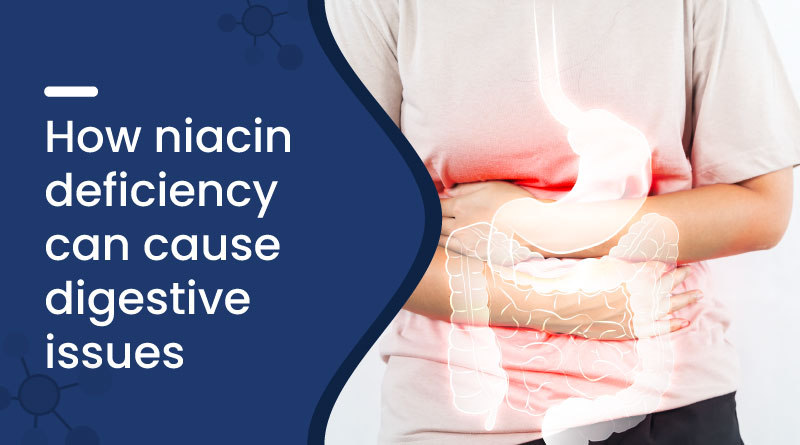How Niacin Deficiency Can Cause Digestive Issues


Niacin deficiency can seriously affect your digestive health. Niacin, also known as Vitamin B3, plays a vital role in converting food into energy and maintaining a healthy digestive system. If your body lacks this nutrient, it can lead to a variety of gastrointestinal problems. This blog explains how niacin deficiency impacts your gut and what signs to look out for.
What Is Niacin and Why Is It Important for Digestion?
Niacin is a water-soluble B vitamin that helps the body break down carbohydrates, fats, and proteins. It also supports enzyme function, repairs DNA, and maintains healthy skin and nerves. Niacin helps produce stomach acid and keeps the gut lining healthy.
Key roles of niacin in digestion:
- Helps convert food into usable energy
- Supports enzyme function in digestion
- Maintains gut lining integrity
- Assists in nutrient absorption
How Does Niacin Deficiency Affect the Digestive System?
When the body doesn’t get enough niacin, several digestive issues can arise. This is especially common in individuals with poor dietary habits, chronic alcoholism, or certain medical conditions like Crohn’s disease.
Common digestive problems caused by niacin deficiency include:
- Loss of appetite
- Nausea and vomiting
- Diarrhoea
- Mouth inflammation (glossitis and stomatitis)
- Swelling or soreness of the tongue
In severe cases, a condition called pellagra develops, which includes diarrhoea, dermatitis, and dementia as classic symptoms.
What Are the Early Signs of Niacin Deficiency in the Gut?
Early digestive signs of niacin deficiency may seem minor at first but can worsen without treatment. Some of the first symptoms you might notice include:
- Constant indigestion
- Burning sensation in the throat or stomach
- Frequent diarrhoea or loose stools
- Tongue redness or swelling
- Painful ulcers or cracks in the corners of the mouth
Ignoring these symptoms may lead to serious complications like chronic gut inflammation and poor nutrient absorption.
Why Does Niacin Deficiency Cause Diarrhoea?
One of the most common gastrointestinal symptoms of niacin deficiency is diarrhoea. This happens because the intestinal lining becomes inflamed, reducing its ability to absorb nutrients and water properly. This leads to frequent watery stools.
Niacin is essential for:
- Maintaining intestinal barrier function
- Supporting enzyme secretion in the gut
- Preventing intestinal inflammation
Without niacin, your gut becomes vulnerable to infection, irritation, and poor digestion.
Can Niacin Deficiency Lead to Inflammation in the Mouth and Throat?
Yes, niacin deficiency often leads to mouth and throat inflammation, known as glossitis and stomatitis. This is because niacin helps maintain the health of mucous membranes in the oral cavity.
Common symptoms include:
- Red, swollen tongue
- Cracked lips or mouth corners
- Burning sensation while eating spicy or acidic foods
- Dry mouth or bad breath
These symptoms are early indicators that your digestive health may be at risk due to low niacin levels.
How to Naturally Improve Niacin Levels for Better Digestive Health?
Improving your niacin intake can help restore digestive balance. A balanced diet rich in niacin sources is the first step.
Foods high in niacin:
- Chicken, turkey, fish
- Peanuts and legumes
- Brown rice and whole grains
- Mushrooms and green peas
- Fortified cereals
Also, ensure your body can absorb nutrients efficiently by avoiding excessive alcohol, managing gut health, and addressing underlying medical conditions.
Frequently Asked Questions
Q. Can niacin deficiency cause bloating?
A. Yes, bloating can occur due to poor digestion and gut inflammation associated with low niacin levels.
Q. Is niacin deficiency common in vegetarians?
A. It can be if their diet lacks fortified grains, legumes, and nuts, which are plant-based niacin sources.
Q. How long to fix niacin deficiency?
A. Mild deficiency can improve in a few weeks with dietary changes, but severe cases may require medical supplements.
Q. What is pellagra, and how is it related to digestion?
A. Pellagra results from niacin deficiency. It leads to diarrhoea, which directly affects digestion and nutrient absorption.
Q. Can digestive disorders lead to niacin deficiency?
A. Yes, conditions like Crohn’s disease or chronic diarrhoea can reduce nutrient absorption, leading to niacin deficiency.
Conclusion
Niacin deficiency is more than just a vitamin shortfall—it can severely disrupt your digestive system, from causing mild indigestion to chronic diarrhoea and inflammation. Understanding the role of niacin in gut health is essential to maintaining proper digestion. If you’re experiencing persistent digestive issues, it’s worth evaluating your vitamin B3 intake. A balanced diet and early attention can prevent complications and restore gut harmony.
Recent Blogs
Disclaimer : Zeelab Pharmacy provides health information for knowledge only. Do not self-medicate. Always consult a qualified doctor before starting, stopping, or changing any medicine or treatment.
Related Products
Need Medicines Quick?
Share location to check quick delivery serviceability.
Change Location
Location Access Needed
Your location appears to be blocked or disabled.
Please enable the location from your browser or
device settings.

₹ 0
0
Items added
Quick Links
Categories
Our Policies
2026 Copyright By © Zeelab Pharmacy Private Limited. All Rights Reserved
Our Payment Partners

 Added!
Added!
|
|













